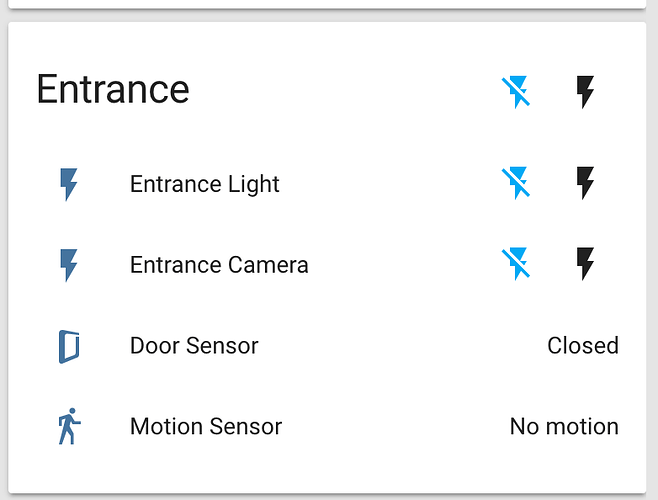Hi All,
I’ve been playing around with the Broadlink S1C sensors (Alarm Kit), I was looking for a way to integrate it into HA and I found the following thread on the python-broadlink github:
Thanks to the work of a user named “jazzina” I managed to “integrate” the broadlink S1C alarm sensors into HA.
It’s not 100% reliable but it’s working (sort of…), maybe someone will have the time to do more testing and make it better and more reliable.
In my setup, I have the S1C Kit which includes only 1 door magnet sensor and 1 motion PIR sensor
First, I used the broadlink e-Control app to add the device and sensors, then I wrote a simple python script which runs in the background, gets the sensors data and publish the data via MQTT.
If you want to try it yourself here are the steps you need to take:
Create a new directory on your Raspberry Pi with an Hassbian distribution:
mkdir /home/pi/s1c
Change directory:
cd /home/pi/s1c
jazzina code wasn’t added to the official python-broadlink library and I didn’t want to to make any breaking changes to my Hassbian so I just downloaded the library from here:
wget https://github.com/jazzina/python-broadlink/blob/master/broadlink/__init__.py -O /home/pi/s1c/broadlink.py
Create a new python script using nano:
nano s1c.py
Change the following code according to your needs and parameters and paste it in the s1c.py file.
s1c.py:
import broadlink import time, os
devices = broadlink.S1C(host=("10.0.0.31",80), mac=bytearray.fromhex("B4430XXXXXXX")) # Change to your S1C IP Address and S1C Mac Address devices.auth()
sens = devices.get_sensors_status() old = sens
while 1: try: sens = devices.get_sensors_status() for i, se in enumerate(sens['sensors']): if se['status'] != old['sensors'][i]['status']: sName = se['name'] sType = se['type'] if sType == "Door Sensor" and str(se['status']) == "0" or sType == "Door Sensor" and str(se['status']) == "128": # Instead of sType you can test for sName in case you have multiple sensors print time.ctime() + ": Door closed: " + str(se['status']) os.system("mosquitto_pub -h 10.0.0.35 -p 1883 -t 'sensors/s1c/entrance_door' -u mosquitto -P password -m " + "Closed") # change the ip address, user name and password for your mosquitto server elif sType == "Door Sensor" and str(se['status']) == "16" or sType == "Door Sensor" and str(se['status']) == "144": print time.ctime() +": Door opened: " + str(se['status']) os.system("mosquitto_pub -h 10.0.0.35 -p 1883 -t 'sensors/s1c/entrance_door' -u mosquitto -P password -m " + "Open") elif sType == "Door Sensor" and str(se['status']) == "48": print time.ctime() +": Door Sensor tampered: " + str(se['status']) os.system("mosquitto_pub -h 10.0.0.35 -p 1883 -t 'sensors/s1c/entrance_door' -u mosquitto -P password -m " + "Tampered") elif sType == "Motion Sensor" and str(se['status']) == "0" or sType == "Motion Sensor" and str(se['status']) == "128": print time.ctime() +": No Motion: " + str(se['status']) os.system("mosquitto_pub -h 10.0.0.35 -p 1883 -t 'sensors/s1c/motion_sensor' -u mosquitto -P password -m " + "No_motion") elif sType == "Motion Sensor" and str(se['status']) == "16": print time.ctime() +": Motion Detected: " + str(se['status']) os.system("mosquitto_pub -h 10.0.0.35 -p 1883 -t 'sensors/s1c/motion_sensor' -u mosquitto -P password -m " + "Motion_Detected") elif sType == "Motion Sensor" and str(se['status']) == "32": print time.ctime() +": Motion Sensor Tampered: " + str(se['status']) os.system("mosquitto_pub -h 10.0.0.35 -p 1883 -t 'sensors/s1c/motion_sensor' -u mosquitto -P password -m " + "Tampered") old = sens except: continue
sensors.yaml:
- platform: mqtt
state_topic: "sensors/s1c/entrance_door"
name: "entrance_door_sensor"
- platform: mqtt
state_topic: "sensors/s1c/motion_sensor"
name: "motion_sensor"
customize.yaml:
sensor.motion_sensor:
friendly_name: Motion Sensor
icon: mdi:walk
sensor.entrance_door_sensor:
friendly_name: Door Sensor
icon: mdi:glassdoor
Run the script (using python 2.7):
python /home/pi/s1c/s1c.py
- Please notice that the s1c.py script should be running in the background all the time so it will be a good idea to run it on startup.
Run the s1c.py as a service:
Create a new file named broadlink-s1c.service:
nano broadlink-s1c.service
paste the following and save:
[Unit]
Description=Broadlink S1C
Wants=network.target
After=network.target
[Service]
Type=simple
ExecStart=/usr/bin/python /home/pi/s1c/s1c.py
[Install]
WantedBy=multi-user.target
Enable the service:
sudo mv broadlink-s1c.service /etc/systemd/system
sudo systemctl daemon-reload
sudo systemctl enable broadlink-s1c.service
sudo systemctl start broadlink-s1c.service
sudo systemctl status broadlink-s1c.service -l
That’s it for now, I haven’t tested this much just for an hour or so and i am not a programmer, if you have any any ideas how to imporve it or if you test it and find any issues or bugs please update this thread.
Screenshots:
Cheers,
Shai.




